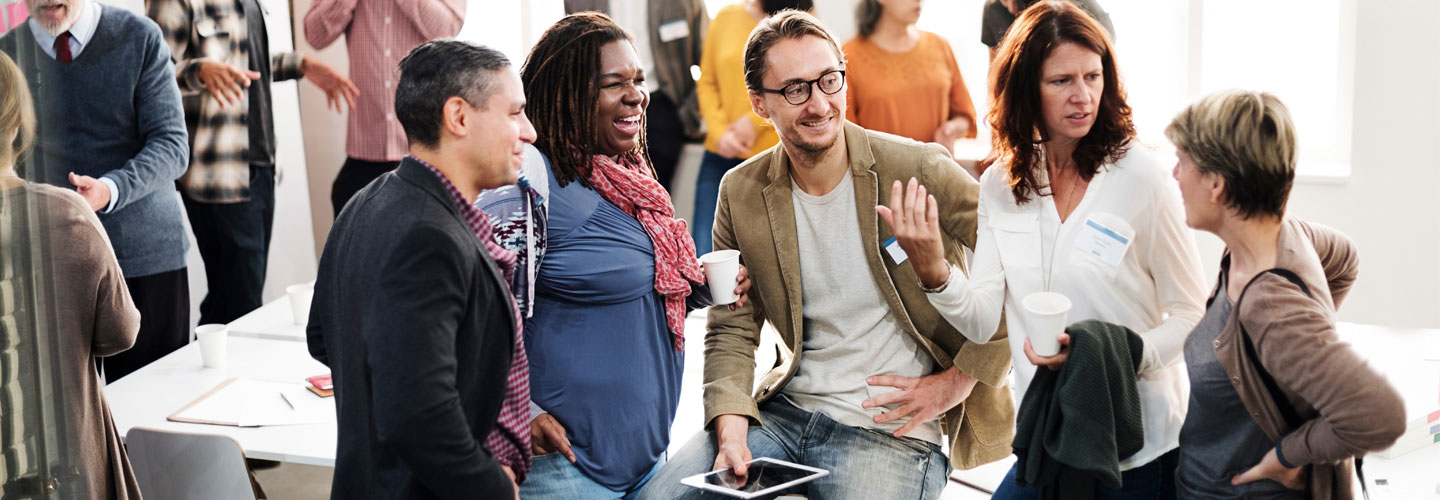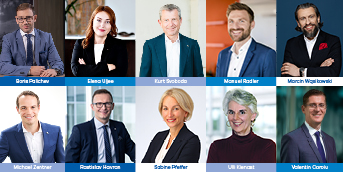



Gender Diversity at UNIQA: Through the lens of our leaders
UNIQA is active in 18 European markets with several companies. A community of this size lives and works through diversity. But in order to create a diverse and inclusive corporate culture in the long term, everyone has to pull together. A clear commitment is needed, especially from the leadership level, because only then is it possible to implement concrete initiatives.
Our Community - The Power of Diversity
One person to whom the topic is particularly close to her heart is Ulrike Kienast-Salmhofer, Group Diversity & Inclusion Officer at UNIQA Austria. She provides insights into how UNIQA has developed in gender diversity in recent years.
You have been working for UNIQA for many years. From your perspective, how has the situation changed in the company and society when discussing gender diversity? Do women have better chances of getting into management positions today?
In society, I perceive a completely different approach at GenZ. For them, gender equality is a matter of course for all genders. Also, framework conditions that are attractive for women are becoming increasingly interesting for men. I am thinking of the flexibilization of working time and place. At UNIQA, the topic has "arrived in our heads". We have understood that it is a matter of changing the environment and have implemented some measures here. We have very successful role models in the countries and Austria as well. This is a basis on which we can build. That is why I see it positively: the chances of equality in all decision-making processes continuously increase!
For 2023, we have set ourselves two concrete goals in Austria: to get more women into management positions and to reduce the gender pay gap in Austria to less than 1 percent in the internal service. Are we well on the way to achieving this?
The measures taken have had an immediate effect on the pay gap. We already managed to reduce it to 0.6% in the first year. It is first and foremost a matter of securing this result, ensuring that new hires do not create new gaps, and - if possible - reducing it further. The development of women in management positions could be more evident. We have succeeded in increasing the proportion of women in management positions. However, the ratio has fallen in the high grades, where top posts are concerned. We have reacted to this and have taken additional measures to adjust to the situation.
What is the biggest challenge for achieving satisfactory results in this area in the long term?
Managers at all levels play a crucial role. Only when gender equality has a recognizable benefit for them can the topic become a "self-runner". Experiences made by oneself help in this. In my opinion, this is still the most effective method. We need more gender-mixed teams so that as many people as possible can experience how enriching this diversity is and what added value it creates.

Diversity insights from the UNIQA countries
To gain more insights when speaking about gender diversity within UNIQA, we have invited leaders from international UNIQA business units to share their views on gender diversity in their country and company and their approach in their private lives.
When it comes to gender equality, women often have their say. This time we especially have aimed to give male leaders a chance to share their thoughts. However, we used this opportunity to include two female leaders – Mrs. Elena Uljee from UNIQA Ukraine, one of the business units with the highest shares of women in the top management and B-1 positions, and Mrs. Sabine Pfeffer, a new female board member of UNIQA Austria.
How do you perceive the issue of gender diversity in your country or regional directorate? Has anything changed in the last few years?
Kurt Svoboda, Member of the Board (Risk and Finance) UNIQA Insurance Group AG: A lot has changed in this area in recent years. Just look at the past 50 years and where we are now. It is a continuous process. Both society and politics are strong drivers. Moreover, different stakeholders also provide different positions and perspectives. The fact that we are more concerned with diversity is important and shows respect and promotes equality.
Michael Zentner, Regional Director of UNIQA Tyrol: The awareness of equality, diversity, and inclusion has grown enormously in recent years in society, which is naturally also reflected in the company and our regional headquarters. I very much welcome the fact that we at UNIQA have committed ourselves to social responsibility by introducing a wide variety of diversity programs and initiatives, such as the Diversity & Inclusion Committee. We are increasingly successfully recruiting women for various sales positions and relevant support functions. However, I would welcome it if we could inspire even more women for management positions.
Manuel Radler, Managing Director UNIQA4WARD: Diversity came naturally from the very beginning when we founded UNIQA 4WARD five years ago. We were always looking for people who are enriching our culture with their personality, with their ideas and views. Diversity is not only about gender, race, age, etc., it is very much about perspectives. The more perspectives there are, the more choices we have and the better our solutions will look like. This is why diversity, as proven in many studies, drives business success.
Rastislav Havran, Chairman of the Board of UNIQA Czech Republic and UNIQA Slovakia: The Czech Republic and Slovakia may still be considered conservative countries because inclusiveness, diversity, gender equality and support for different talents and perspectives were not championed enough in the past. Therefore, within some, usually older or rural, communities, it may be difficult for people to accept “otherness”.
However, younger generations especially have different expectations and approaches to these topics. UNIQA´s contribution to positive change is, in a way, a promise for everybody for "living better together".
Boris Palichev, General Manager SEE and CRDO*: In the SEE region, we live diversity and consider it a key enabler of the organization to quickly seize opportunities and deal with the ever-growing complexity around us. We are proud that in the SEE region leadership team appr. 60% of the colleagues are female. There are eight nationalities, various educational backgrounds, different age groups, experiences, religions, etc. We follow our One Team principle whereby every team member has an equal opportunity to grow and develop.
*Serbia, Croatia, Bosna and Hercegovina, Montenegro, Bulgaria
Valentin Coroiu, Vicepresident of the Board, UNIQA Asigurari S.A.: Gender equality remains an essential topic in the corporate world in our country (Romania) and worldwide. As a crucial company activating in such a challenging industry, we are responsible for putting this awareness on the agenda and have the power to lead the way forward in creating flexible workplaces for women and men alike.
I firmly believe that achieving greater gender parity can benefit all parties involved, but more importantly, it will play a defining role in sustaining the dynamism of organizations.
Elena Uljee, CEO UNIQA Insurance Ukraine: UNIQA Ukraine has made significant progress in promoting gender diversity, with women represented in multiple roles and positions. Currently, 68% of all employees in the company are female, and women hold 60% of management positions. In the regional network, 65% of employees are female. We are looking at a more balanced approach in some areas that will come with time without compromising qualifications.
Moreover, the Board of Management is equally split 50/50 between men and women, demonstrating a commitment to gender diversity.
Marcin WĄSIKOWSKI, D&I Manager, UNIQA Poland: From my perspective, the diversity topic linked with gender for a few years is rising in the CEE region. Adequately addressed and developed can have a positive impact, once and for all, on the future role of females and males, which is so much different than in the past. Poland is on the road to change. With 57.7 out of 100 points, Poland ranks 21st in the EU on the Gender Equality Index. Its score is 10.9 points below the EU's score. There is still a lot to do in this regard. I believe Gen Z, as the first generation, is not so much infected by old stereotypes or behaviors.
How do you deal with the UNIQA efforts to establish and support diverse and inclusive working environments in your area of influence?
Kurt Svoboda: I see the efforts positively and fully support them because a good and healthy mix is also essential to me personally and in my professional life. Diversity promotes innovation and transparency and helps us in our dealings with each other, which positively affects the corporate culture. My philosophy here is that balance and a good fit are always more important and, above all, more effective than any rules that are followed just for the sake of it.
Michael Zentner: An inclusive and non-discriminatory working environment can only work through the cooperation of all those involved and must, of course, be exemplified by managers. That is why I need to sensitize managers to the issue so they can pass it on to their employees accordingly.
Manuel Radler: Different people have different perspectives. Listening to and learning from different views is deeply rooted in our culture. It is also about being open and supporting each other. Our colleagues always support Diversity and Inclusion initiatives, for example volunteering for the Austrian Special Olympics in summer 2022 which was sponsored by UNIQA.
Rastislav Havran: Although the representation of women in senior positions in Slovakia and the Czech Republic is increasing, it is still below the European Union average. A positive example in this respect is our 6-member Board of Directors of UNIQA CZ/SK, which is absolutely gender-balanced. We have three women represented, and what is more, as we are an international corporation, four nationalities are represented in the Board. That brings to our thinking and decision-making additional critical perspectives and experience.
I am also aware that most parents of young children consider work and family life balance important, and they value flexible working hours. That is why UNIQA also offers the possibility of part-time job and the possibility of working from home if the nature of the work allows it.
Boris Palichev: SEE region is entirely based on community and agility principles. Thus diversity is embedded into our working methods and is one of our significant advantages. In this setup, we balance many factors to ensure people are heard, respected, and supported. We should recognize the bigger picture of each person and the diversity of personality traits and be empathetic so UNIQA will become an employer of choice for every talent, regardless of gender, political orientation, or nationality.
Valentin Coroiu: When discussing diversity and inclusion, for me, it is essential to focus not just on our differences and what separates us but also on what we share and have in common. When people feel comfortable being themselves in their work environment, they are able and motivated to give their best for the company's benefit, supporting a harmonious organizational culture. This helps to create a work culture in which everyone feels equally listened to and involved.
Elena Uljee: As part of our HR strategy, we have implemented an e-learning course on diversity and inclusion (D&I) that all employees have completed to equip the team with the knowledge and skills to support a workplace culture of respect and equality. To further support this effort, we will introduce new D&I policies this year, and our managers will undergo specialized training to help them avoid unconscious biases related to D&I issues. We also plan to collaborate with public organizations that promote the rights of individuals with disabilities to ensure that our workplace is accessible and inclusive for all.
Addressing the issue of gender pay disparity is a priority for us, and we will conduct a thorough job evaluation this year to better understand the current situation. This will enable us to take the necessary steps to close any gender pay gap if it exists.
Marcin Wasikowski: From the top to the toe - let's say like this. The most important is total commitment and involvement of all our board members and top managers. More to say, D&I is more than just an initiative. It is part of our strategy of building a solid presence of the UNIQA Group in Poland. To simplify it, we set and agreed on three primary goals for the coming years: the presence of women in managerial positions, sexual orientation, and generations.
How do you share the tasks in your home? Loading the dishwasher and taking care of the laundry? Or more changing the wheels of the car and operating the thrilling machine? Is it essential or of no relevance to think about and discuss it?
Kurt Svoboda: In a partnership, everyone has their strengths and weaknesses, preferences, and a particular DNA of their origin - that's how I live with my family. I can't and don't like to cook, so my wife takes care of that. I do help out around the house. I am an enthusiastic hoover. But this is more because the cordless device is fantastic and fascinates me technically. But it's important to divide the tasks so that not everything rests on one shoulder. However, it is often difficult for me to discuss things with my wife and two daughters.
Michael Zentner: It should be a matter of course now that household tasks are shared. The view that specific tasks are exclusively "women's business" is outdated, in my opinion. Especially when both are working - as in our case - we try our best to support each other. We divide the tasks as best we can so that we can enjoy our free time together.
Manuel Radler: I think it is very important to discuss this. I grew up in a family with a rather classical split of responsibilities. But there was always appreciation for everybody’s contributions, and I think this is one of the keys why it worked well. In general, I do not think the most important question is who is doing what at home. Most important is that everybody is contributing to the best of their ability and that these contributions are valued. This is an important basis for a happy environment at home.
Rastislav Havran: The famous French phrase "cherchez la femme" brings it to the point in my case. Without my wife's support and my children's smiles, it would have been impossible to succeed at my job. I must admit that with constant traveling and being present in two countries, the pressure on handling the household lies on my wife's shoulders. However, when we are together, we are taking care of our household also together.
Boris Palichev: The question somehow contains the answer, and it is sharing. I believe, in family as well as in business, teamwork and caring are the key to success.
Valentin Coroiu: Housekeeping is part of everyday life in our family, and we all contribute as much as we can. My sons and I take care of many chores supported by household devices for cooking, doing the dishes, washing clothes, and dusting, but a lady’s hand always makes a difference. I firmly believe that both genders must work side by side equally in these modern times and the future, for generations to come, sharing their contribution at home and in their professional life. As always, good communication and understanding are key decision-makers.
Elena Uljee: We follow a partnership approach where we share essential household responsibilities (which each of us can really do e.g., loading dishwasher) based on personal availability and goodwill but under the precondition that it must be done in time. I prefer not to drill or change wheels for the once-offs, but I gladly take over electrical and internet connections. The key is talking, reaching agreement, sharing, and teamwork.
Marcin Wasikowski: There are no male or female tasks at my home. There are only three points that we consider who will do it: will, spare time, or mood to do, for example: wheel change, going to doctors with our son, cooking, or planting flowers.
"Women in leadership are strong and courageous"
Since April, UNIQA in Austria has once again a woman on the Management Board in the person of Sabine Pfeffer. Therefore, we also asked her about the topic of gender diversity:
Does it affect the atmosphere in the team if the leader is a woman? if so, in which way?
I can name impressive personalities, both women and men, who have been and still are role models for me. I think women are strong and courageous leaders who know how to motivate and inspire their staff better and give teamwork a lot of room. Women are more empathetic, perceive things more intuitively, and thus have a different strategy of assertion. Men have a certain elbow mentality and already celebrate successes, while women are still much more self-critical.
I am convinced that diversity positively influences both corporate culture and corporate success and that mixed management teams are economically more profitable.
In your opinion, is there a different perception of the issue depending on which generation one belongs to? Is it even an issue for today's young adults
The existence of different generations causes different demands and expectations for opportunities, careers, life goals, and visions for the future, which are becoming more and more noticeable. I perceive a clear striving for broad positioning, independence, and work-life balance among young adults.
Companies must face this change and develop new models and solutions to meet their desires and expectations.
You might also be interested in


Diversity as opportunity: More women in Sales

Interview: Diversity at UNIQA
